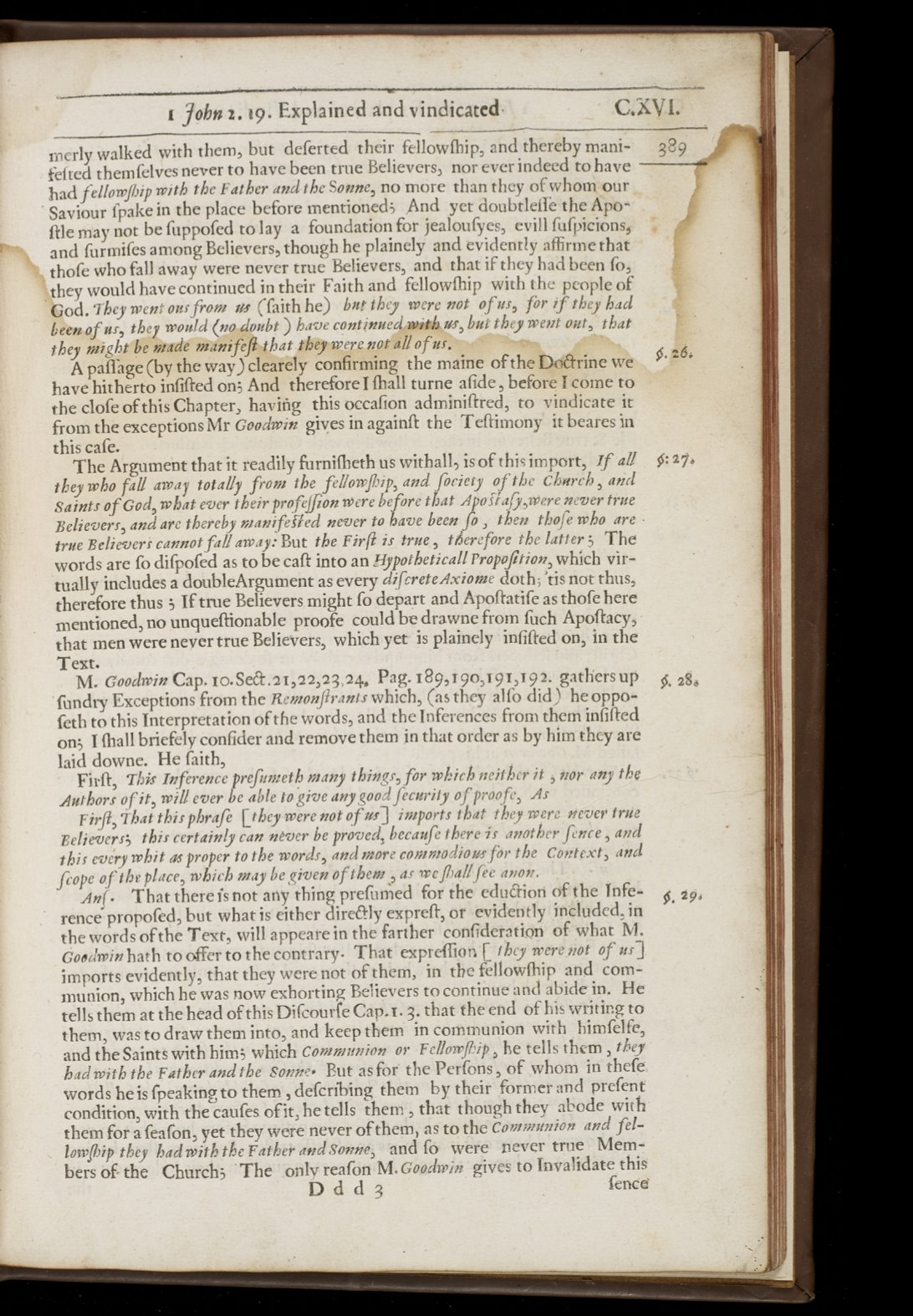

John
2.19. Explained and
vindicated
C.XV1.
merly walked
Yvith
them,
but
deferted their
fellowfhip,
and thereby mani-
389
felted themfelves never
to
have
been
true
Believers,
nor ever indeed
to
have
had
fellowfbip with
the Father and the
Sonne,
no
mere
than
they
ofwhoin our
Saviour fpake
in
the
place
before mentioned; And yet
doubtlefï'e
the
Apo-
ale
may
not
be fuppofed
to
lay a
foundation for
jealoufyes,
evil!
fufpicions,
and
furmifes
among
Believers,
though
he plainely
and evidently
affirme
that
thofe who
fall
away
were never
true
Believers,
and
that
if
they had
been fo,
they
would have continued
in
their Faith and
fellowfhip
with
the
people
of
God.
They
went
our
from
us
(faith he)
but
they were
not
of
us,
for
if
they
had
been
of
us,
they would no
doubt)
have continued
with
us,
but
they went
out,
that
they
might
be
made
manifefl
that
they were
not all
of
us.
4 xB.
A
paffage
(by the
way.)
clearely confirming
the
maine
of
the Do
&rine we
have
hitherto
infifred
on And therefore
I [hall
turne
afide ,
before
I
come
to
the
clofe
of
this Chapter, having this
occafion
adminifired,
to vindicate it
from the
exceptions Mr
Goodwin
gives in
againft
the
Teftimony
it beares in
this
cafe.
The
Argument
that it
readily furnifheth
us
withall,
is
of
this
import,
If
all
§:21
they who
fall
away
totally
from
the fellowfhip,
and
fociety
of
the Church,
and
Saints
of
Gad,
what
ever
their
profeffion were before
that Apoliaf
,here
never true
Believers, and are
thereby raanife.{ted
never
to
have
been
fo
, then
thofe
who
are
true Believers cannot
fall
away:
But the
Firff
is true , therefore the
latter; The
words are
fo
difpofed
as
to
be
caft
into
an
Hypothetical! Propofition,
which
vir-
tually includes
a
doubleArgument
as
every
dif'
reteAxiome
doth;
'tis
not thus,
therefore thus
;
If
true
Believers
might
fo
depart andApoftatife
as
thofehere
mentioned, no unyueftionable proofe could
be drawne
from
fuch
Apoftacy,
that
menwere never
true
Believers, which
yet
is
plainely infifted
on,
in
the
Text.
M.
Goodwin
Cap. to.Se&.21,22,23,24,,
Pag.189,t90,191,192.
gathers up
§.
zg,
fundry Exceptionsfrom the
Remonfirants
which, (as they
alfo
did)
he
oppo-
feth
to
this
Interpretation
of
the words, and the
Inferences from
them infifted
on
I
(hall
briefely confider
and removethem in
that
order
as
by
him they are
laid
downe. He faith,
Firft,
This Inference prefumeth many
things,
for
which neither
it
, nor
any
the
Authors
of
it,
will ever
be
able
to
give any
good
fecurity
of
proofe, As
Firfl, That this phrafe
[they
were
not
of
us]
imports
that
they
were
never true
Believers;
this
certainly can never
be
proved,
becaufe
there
is
another
fence, and
this
evéry
whit
as
proper
to
the words,
and
more commodious
for
the Context,
and
fcope
of
the
place, which may
be
given
of
them
,
as
we
fhallfee
anon.
Anf
.
That
therefs not
any
thing
prefiimed
for the
edu
&ion
of
the
lope-
4.
0,
rence propofed,
but
what
is
either
direly
expreff,
or
evidently included,
in
the
words
of
the
Text,
will
appeare
in
the farther
confederation
of
what
M.
Goodwin
bath
to
offer
to
the contrary.
That
expreflion
[
they were
not
of
ne].
imports evidently,
that
they were
not
of
them,
in
the
fellowfhip
and com-
munion,
which he was now
exhorting
Believers
to continue
and abide in.
He
tells them at the head
of
this Difcourfe
Cap.'.
3.
that the
end
of
his
writing
to
them,
was
to
draw
their
into,
and keep
them
in
communion with
himfelfe,
and
the
Saints
with him;
which
Communion or Fellowfhip,
he
tells them
,
they
had with
the
Father and the
Sonne.
But
as
for the Perfons,
of
whom
in
thefe
words
he
is
(peaking
to
them
,
defcribing them by their former
and
prefent
condition, with the
caufes
of
it,
he tells
them
,
that
though they abode with
them for
a
feafon, yet they were never
of
them,
as
to
the
Communion
and
fe!-
low hip
they had
with
the
Father and
Bonne;
and
fo
were never
true
Mem-
bers
of-
the Church;
The
only reafon
M. Goodwin gives
to Invalidate
this
Ddd3
fence










